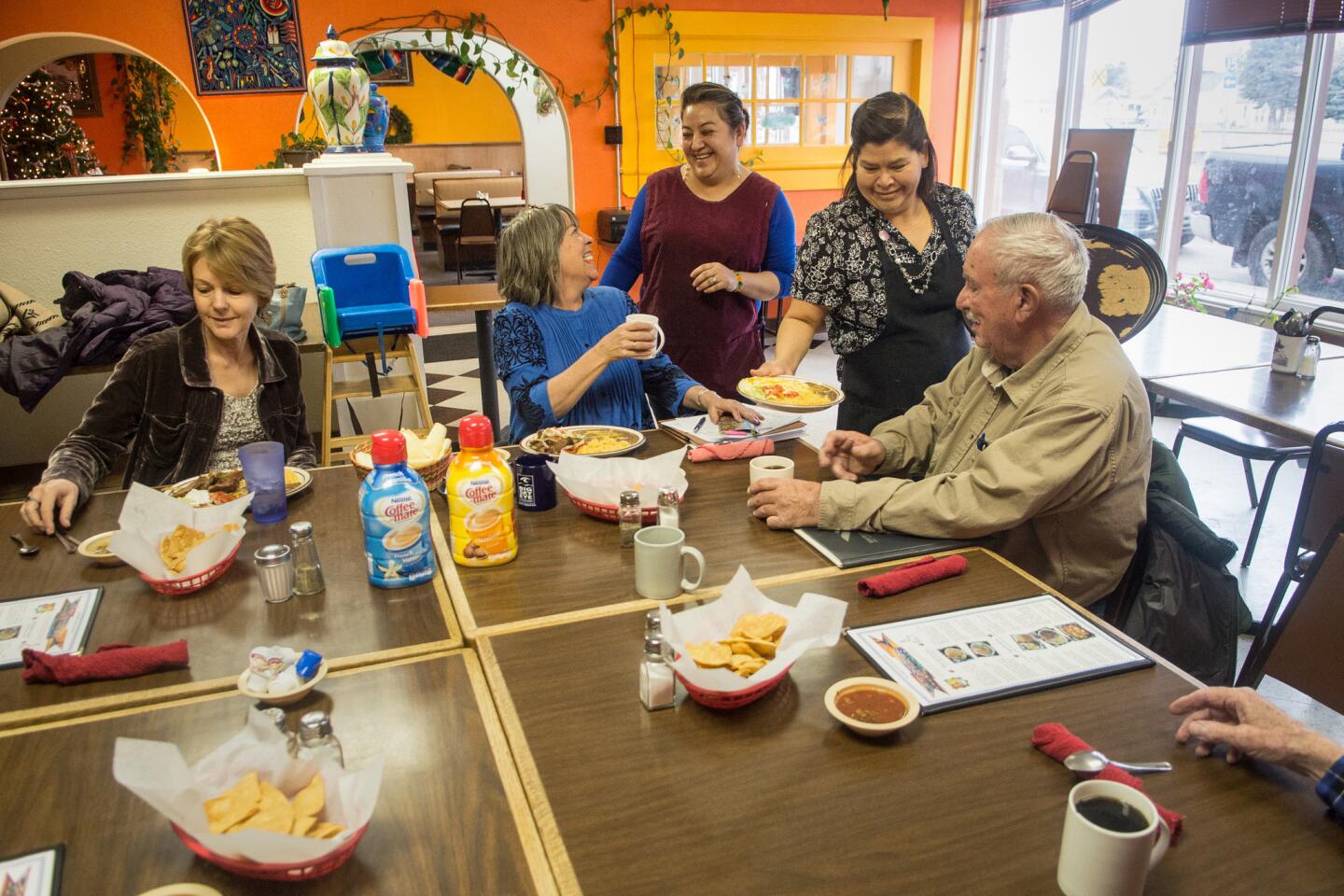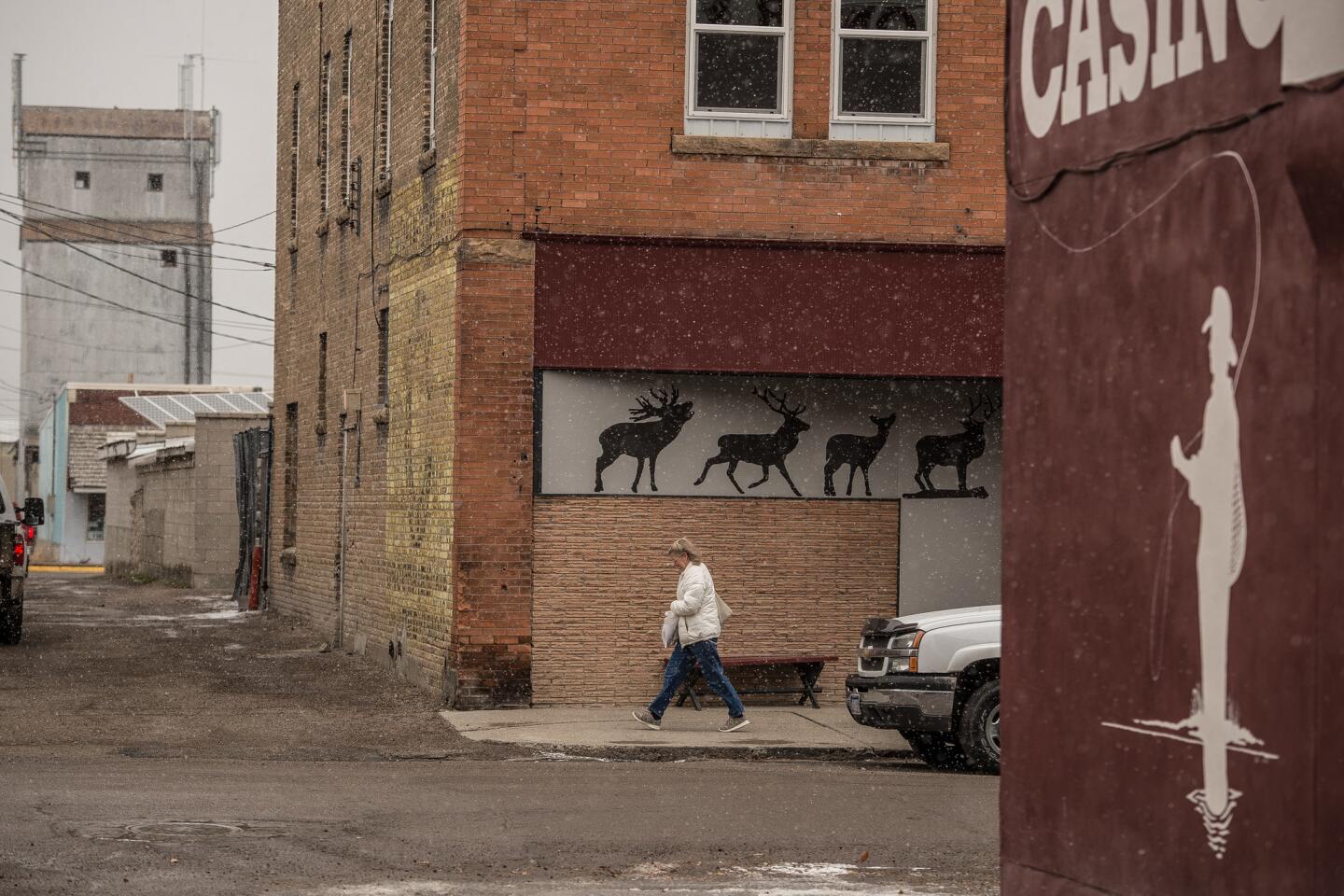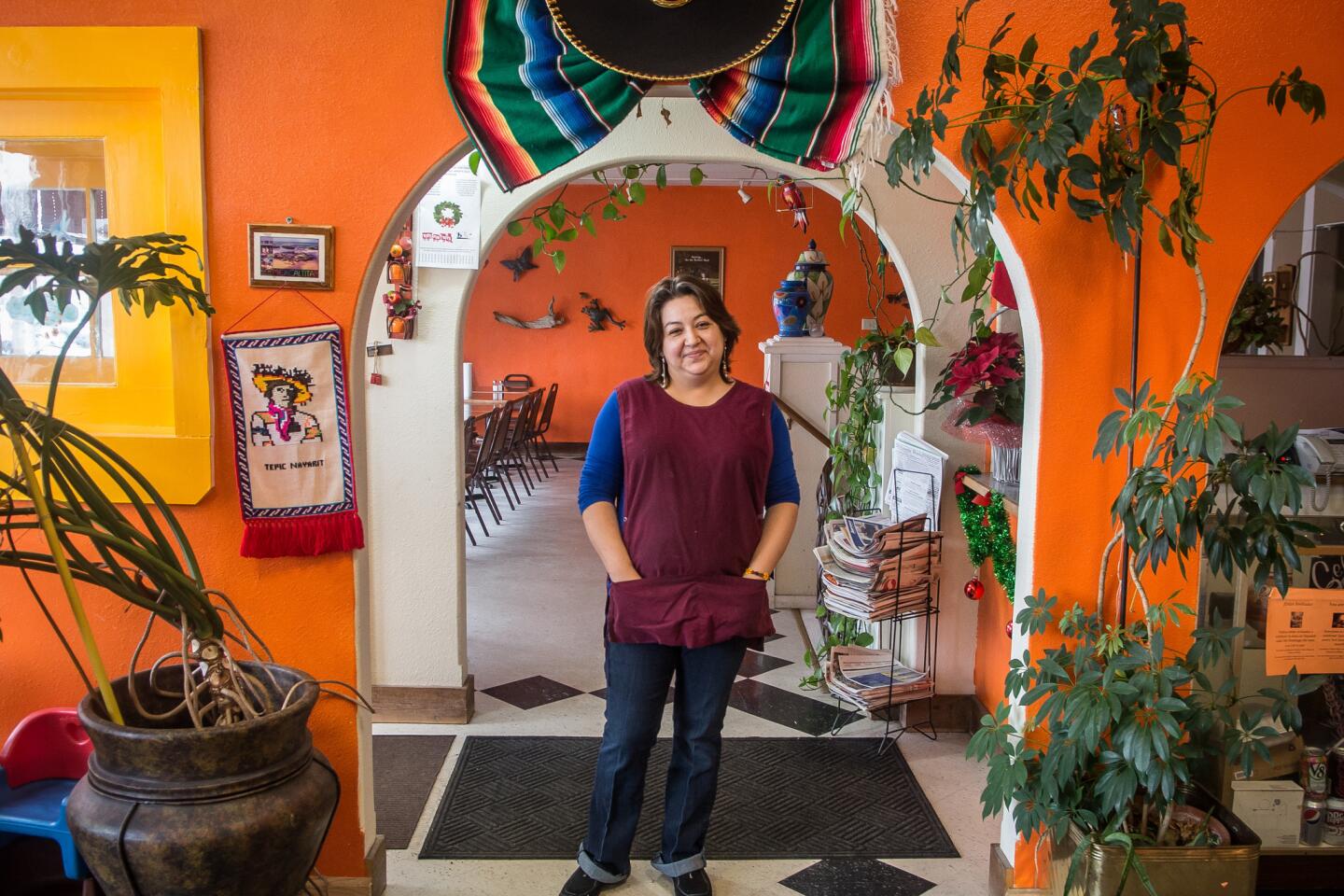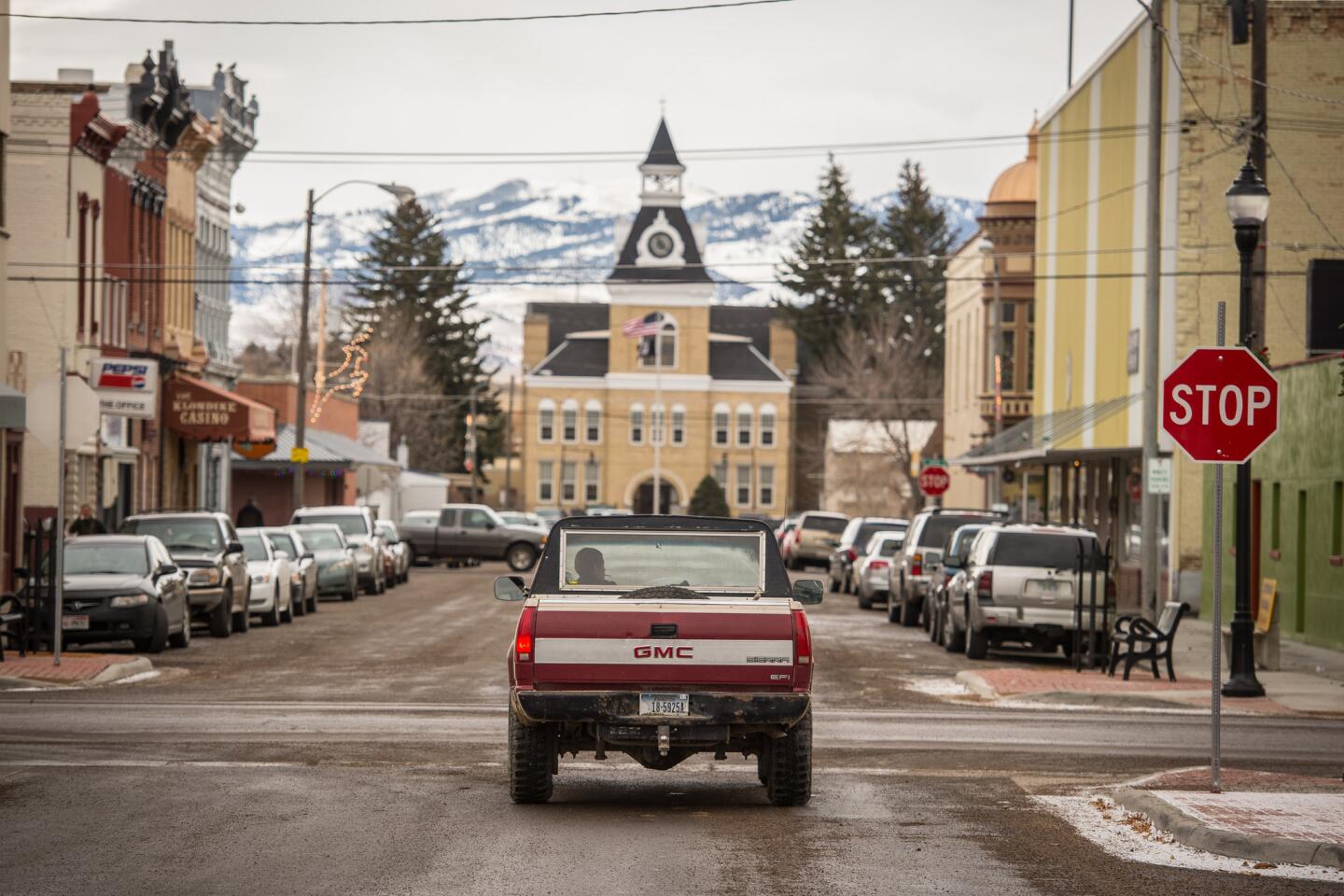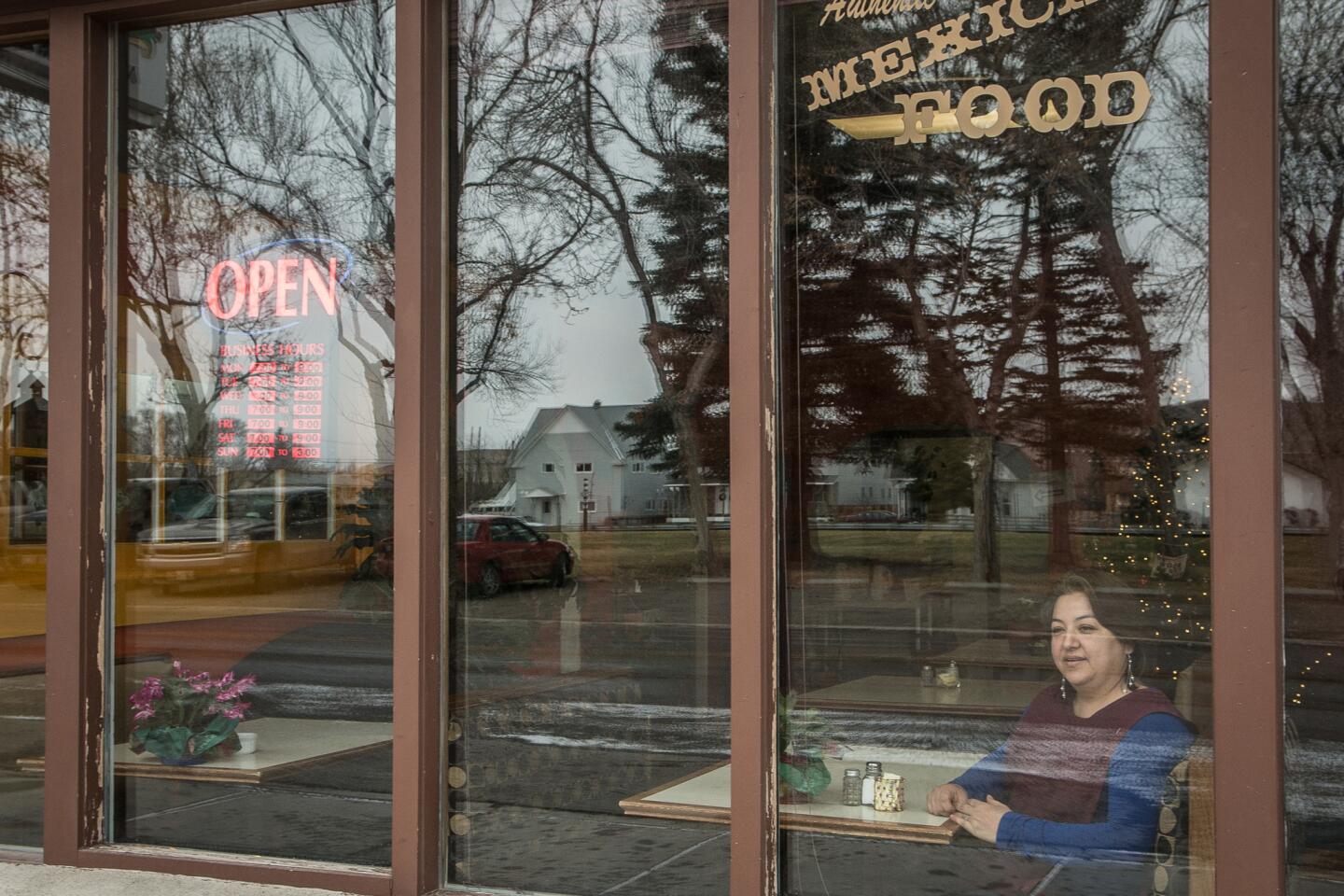At a Montana restaurant, talk about illegal immigration spills a revelation
Reporting from DILLON, Mont. — Yeni Mora floated in from the kitchen with a smile and set two carafes of freshly brewed coffee on a table seating 20 of her most devoted patrons.
Her Mexican restaurant in this town of 4,000 is a place where locals like to say they compete to “try to tell the biggest lie,” and where what happens around the world, or just across the street, is debated over eggs, coffee and jugs of creamer the size of a lap dog.
As Mora, a 36-year-old from the central coast Mexican state of Nayarit poured coffee, her customers opined about an issue that’s buzzed through talk shows, diners, social media and Montana’s legislative halls, where lawmakers passed several laws targeting illegal immigration.
Some of the diners at Los Koritas said “lazy Americans” bear some blame for illegal immigration; others said ranchers and farmers had to hire immigrants without papers because of burdensome work visa programs.
George Warner, 57, tried to sum up the general opposition in the room to illegal immigration.
“If someone gets an edge up or benefit without earning it, people in Montana take offense to it,” he said. “There is a rule book, and if you don’t follow the rule book, people will take offense to it.”
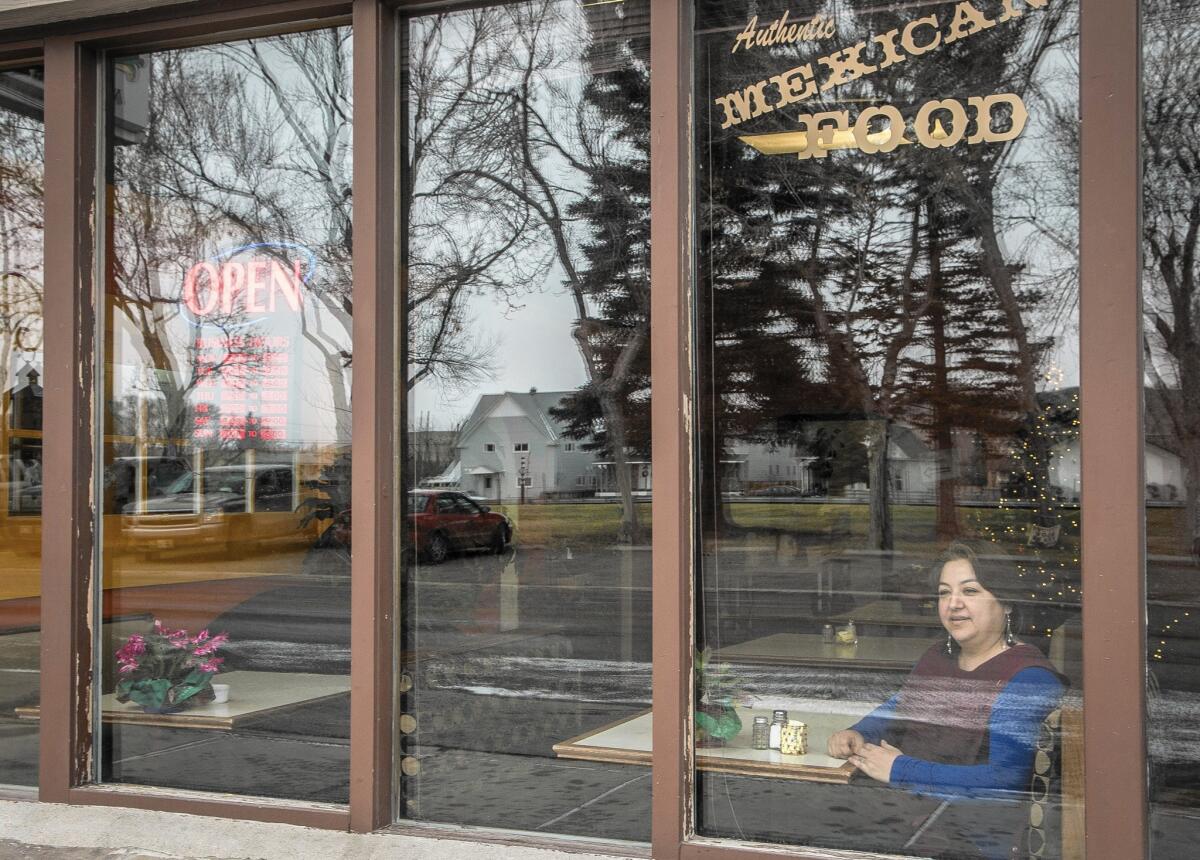
As the diners chatted, Mora hurried about her restaurant. She affectionately calls her customers mis viejitos — my little old men and women.
“I see them as my family,” she said.
Montana has about 1 million residents, and 89% of them are white. About 3% of the population is Latino. Some are American citizens and some in the country illegally.
Illegal immigration hasn’t dominated public discourse the way it has in Arizona or California, but in recent years lawmakers in this state bordering Canada have proposed a variety of measures to crack down.
In 2012, Montana voters approved an initiative requiring state agencies to determine an applicant’s immigration status before granting a variety of services, including unemployment benefits and infant hearing screenings. A judge struck down most portions of the law in 2014.
David Schuett, a rancher who produces cattle, barley, wheat and hay, is one of the few around Dillon with regular contact with people in the country illegally. He also employs Mexican nationals via a work visa program.
He also successfully persuaded Montana State University to allow the son of one of his most senior workers to pay in-state tuition despite being in the country without legal status.
“Some just don’t have that human connection,” Schuett said.
About 75 miles northeast in the town of Manhattan, population 1,500, Charlie Hoekema echoed sentiments in Dillon that “illegal immigration has made America lazy.”
“I believe if you don’t work, you don’t eat,” the 63-year-old said as he settled into lunch at the Garden Cafe, digging into a beef patty served on a slice of white bread, topped with mashed potatoes and drowned in gravy. Hoekema, who runs a trucking business, said his Dutch ancestors came to the U.S. legally and everyone else should do the same.
“I’m old-school,” he said. “We’re full.”
Cafe owner Nick Schmutz, an immigrant from Sweden, sidled up to Hoekema.
“You know why I’m closing early now? Because I cannot find help,” he told Hoekema. “Nobody wants to work. I came here as an exchange student and had a visa. I overstayed my visa and I worked for the state of California … taking care of a quadriplegic. It was a job nobody wanted.”
“Let’s send you back to California,” Hoekema told Schmutz with a nudge and a smile.
Hoekema said he’s a conservative Republican who believes paying American workers a fair wage may be the solution to avoid illegal hiring, even if that drives up the cost of products or services.
Hoekema added that he “respects Mexican workers.… I think they are good people, hard-working people. They just have to come here legally.”
Mora’s family is one of only a few Mexican households in Dillon, a railroad town founded in the 19th century by a Union Pacific president, Sidney Dillon.
Mora came to the United States from Mexico about 10 years ago. She had been a single mother with three small children after her divorce. She made her way from Arizona to Colorado, alone, working a hotel job in the mornings and in a restaurant at night.
After a year Mora saved up enough money to send for her children. When the family moved to Montana they ended up in a town called Twin Bridges. She has identical twin girls, now 14, and a 10-year-old boy.
“When we lived in Twin Bridges, my children didn’t like going to school. They were looked at like strange animals,” she said. “On the bus, the children would give them the middle finger.”
Dillon was different.
“I think you just have to know how to get along with people and smile and wave to people you may not even know,” Mora said. “I’ve never felt racism here.”
But she added: “You really stick out when you’re brown in this town.”
She saved enough to take over the one Mexican restaurant in Dillon about three years ago and renamed it Los Koritas, her variation on a name for indigenous people from Nayarit.
When the Longhorn Saloon closed two years ago, some customers approached Mora with a request. They no longer had a place to meet in the mornings, they told her. Could she open for breakfast?
Mora said of course.
The new breakfast hours were popular, though Mora learned to make some adjustments. Los Koritas served only Mexican food, but Mora began to let customers order off the menu, mostly American-style breakfasts. She stored the creamers the group members bought in her refrigerator.
Then one day this fall, as Mora was preparing their orders, Warner and other diners were holding forth on rule-breakers and the dangers of illegal immigration. They did not know Mora was one of those rule-breakers. Four cups of coffee in, they found out when a reporter, with Mora’s blessing, mentioned that she had entered the country illegally when she crossed into Nogales, Ariz., a decade ago.
At first the reaction was disbelief. Yeni? Really?
Warner became pensive. He would definitely be unhappy if Mora were to be deported, Warner said, but he reiterated his disapproval of anyone coming to the U.S. illegally.
“But that doesn’t mean we wouldn’t help her,” he said. “As far as we’re concerned, she’s one of us.”
More than a month after her secret was spilled like coffee in her restaurant, neither Mora nor her viejitos talk about it.
See more of our top stories on Facebook >>
This isn’t to say they’ve changed their minds about illegal immigration. But it’s just not part of the conversation at Los Koritas now. Warner too has moved on from the topic. Yeni is still Yeni to him.
Mora said she just wishes that, when it comes to illegal immigration, “they didn’t see me as the exception. There are many like me across the nation. We had to come illegally. There was no other way.”
Soon after she began opening her doors for breakfast, some customers gave Mora a small hand-painted sign they had made: “Jenny’s Place.” They suggested this would be a good name for her restaurant.
Mora hung the gift in the restaurant foyer, just above a small woven banner emblazoned with “Nayarit, Mexico.”
She would keep the restaurant’s name Los Koritas.
Twitter: @thecindycarcamo
Hoy: Léa esta historia en español
ALSO
Oscars 2016: Here’s why the nominees are so white -- again
Chino Hills 7-Eleven still waiting for its Powerball winner to come forward
Tension between ranchers and federal officials is dangerously high in Nevada
More to Read
Sign up for Essential California
The most important California stories and recommendations in your inbox every morning.
You may occasionally receive promotional content from the Los Angeles Times.
